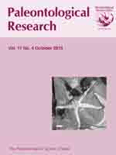
PALEONTOLOGICAL RESEARCH
Scope & Guideline
Discovering the Dynamics of Life's Evolution.
Introduction
Aims and Scopes
- Taxonomic and Systematic Studies:
The journal publishes extensive taxonomic and systematic revisions of various fossil groups, detailing new species descriptions and classifications that contribute to the understanding of paleobiological diversity. - Geological and Paleoenvironments Analysis:
It emphasizes the analysis of geological formations and their fossil contents, providing insights into past environments and ecological conditions through studies of sedimentology and paleobiogeography. - Paleoecological and Biostratigraphic Research:
Research that focuses on reconstructing past ecosystems and understanding the distribution of fossils in geological time is a core area, linking fossil records to broader ecological and evolutionary patterns. - Morphological and Functional Studies:
The journal includes studies on the morphology of various organisms and the functional implications of their anatomical features, enhancing understanding of evolutionary adaptations. - Paleontological Methodologies:
Innovative methodologies in paleontological research, including advanced imaging and analytical techniques, are also highlighted, showcasing how modern technology enhances the study of ancient life.
Trending and Emerging
- Diatom and Microfossil Research:
There is a growing emphasis on the study of diatoms and other microfossils, indicating a trend towards understanding past aquatic environments and their responses to climatic changes. - Ammonoid Diversity and Evolution:
The exploration of ammonoid taxa, particularly heteromorphs, is emerging as a significant theme, shedding light on evolutionary patterns and morphological diversity during the Mesozoic. - Integration of Technology in Paleontology:
The adoption of advanced imaging techniques, such as micro-X-ray computed tomography, is increasingly prevalent, enhancing the analysis of fossil structures and their functional interpretations. - Paleobiogeographical Studies:
Emerging themes include investigations into the paleobiogeographical distribution of taxa, particularly in relation to tectonic movements and ancient sea-level changes, reflecting a broader interest in global patterns of biodiversity. - Fossilized Ecosystems and Community Dynamics:
Research focusing on the reconstruction of ancient ecosystems and community interactions is gaining attention, highlighting the importance of understanding ecological dynamics through time.
Declining or Waning
- Nonmarine Paleontology:
There has been a noticeable decline in the frequency of publications focused on nonmarine paleontology, particularly regarding terrestrial vertebrates and plants, which may indicate a shift towards marine-focused studies. - Paleoanthropology:
Research pertaining to human ancestors and primate fossils appears to be waning, possibly due to the increasing specialization of journals focusing solely on human evolution. - Paleoenvironmental Climate Studies:
While still relevant, the volume of studies linking paleontological records directly to climate change and paleoenvironmental reconstructions has decreased, reflecting perhaps a broader interdisciplinary approach being taken in other journals.
Similar Journals
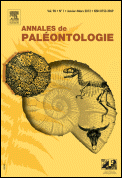
ANNALES DE PALEONTOLOGIE
Unearthing the Past, Shaping the FutureANNALES DE PALEONTOLOGIE is a distinguished academic journal published by MASSON EDITEUR that plays a pivotal role in the field of paleontology. With an ISSN of 0753-3969 and an E-ISSN of 1778-3666, this journal has been a vital resource since its inception in 1988, continuously contributing to the advancement of knowledge in Earth and Planetary Sciences, particularly focusing on paleontological research. Currently ranked #68 out of 113 in its category by Scopus, and celebrated for its Q2 quartile standing, ANNALES DE PALEONTOLOGIE publishes innovative studies, reviews, and discussions that appeal to a diverse audience of researchers, professionals, and students. The journal aims to foster a deeper understanding of paleontological phenomena and encourages interdisciplinary collaboration within the scientific community. Although it is not an open access journal, its commitment to scholarly excellence ensures that the content is highly regarded and widely referenced in academic circles. Situated in Issy-les-Moulineaux, France, it continues to maintain a global readership while promoting significant advancements in paleontological research.

Boletim Paranaense de Geociencias
Connecting Local Discoveries to Global NarrativesBoletim Paranaense de Geociencias, published by UNIV FED PARANA, EDITORA, serves as a vital platform for advancing knowledge in the field of Earth and Planetary Sciences, contributing significantly to discussions surrounding geological research and discovery. With an ISSN of 0067-964X, this esteemed journal primarily features studies that reflect regional geological contexts while also addressing wider planetary science issues. Although it currently holds a Q4 category quartile ranking and a 15th percentile in the Scopus rankings within its field, the journal remains committed to disseminating valuable insights and fostering academic discourse. This is of particular significance as it tirelessly updates its publication scope, aiming to include contributions from diverse geological studies both regionally and globally. While it operates on a printed basis, researchers and students alike will find the Boletim’s progressive discussions critical for understanding the dynamic processes shaping our planet.
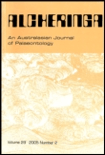
ALCHERINGA
Illuminating the Path of Scientific DiscoveryALCHERINGA, published by Taylor & Francis Ltd, is a distinguished academic journal that has been at the forefront of research in the fields of ecology, evolution, behavior, systematics, and paleontology since its inception in 1975. With an ISSN of 0311-5518 and E-ISSN 1752-0754, this journal serves as a critical platform for the dissemination of high-quality research, contributing significantly to the understanding of biological and geological sciences. Ranking in the Q3 quartile for both Ecology, Evolution, Behavior and Systematics, as well as Paleontology, ALCHERINGA is well-positioned within the academic community, attracting submissions from researchers across the globe. The journal's Scopus ranks further highlight its relevance, particularly its position in the 51st percentile for Ecology and the 50th percentile for Paleontology. Although it does not operate under an open access model, ALCHERINGA remains committed to providing valuable insights and fostering discussions that are essential for the advancement of these vital scientific disciplines. Researchers, professionals, and students are encouraged to explore the profound implications of the studies published within, making it an indispensable resource for anyone aiming to deepen their expertise in these fields.
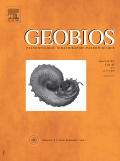
GEOBIOS
Unveiling the Secrets of Planetary ScienceGEOBIOS is a prominent academic journal published by Elsevier France-Editions Scientifiques Medicales Elsevier, specializing in the fields of Paleontology, Space and Planetary Science, and Stratigraphy. With a rich publication history dating back to 1966, the journal aims to foster scholarly communication and dissemination of significant research findings among professionals and researchers in earth sciences. Recognized for its impact within the scientific community, GEOBIOS holds a respectable Q2 ranking in several categories, positioning it within the top tiers of scientific journals. Despite its traditional publication format, the journal provides a platform for groundbreaking studies that influence our understanding of both the geological past and future planetary developments. The journal's consistent ranking, including Rank #36 in Paleontology and Rank #59 in Space and Planetary Science, underscores its relevance and significance in its field. GEOBIOS serves as an essential resource for those engaged in the exploration of earth's history and its extraterrestrial counterparts, making it invaluable to researchers, students, and professionals alike.

Stratigraphy
Bridging Geological Time with Fossil InsightsStratigraphy is a distinguished journal dedicated to advancing the field of paleontology and stratigraphic research. Published by MICRO PRESS in the United States, this journal is accessible via its ISSN 1547-139X and E-ISSN 2331-656X, providing an essential platform for researchers, professionals, and students alike. With a robust focus on the intricate relationships between geological time and the fossil record, Stratigraphy aims to disseminate high-quality research that enhances our understanding of Earth’s history. Its ranking within the 2023 Q2 category of paleontology reflects its commitment to scholarly excellence, as noted by a Scopus ranking of #65 out of 113 in the Earth and Planetary Sciences domain, placing it in the 42nd percentile. Although not open access, the journal's valuable contributions from 1988 to 2024 encourage a collaborative dialogue among the scientific community, underscoring the significance of stratigraphic studies in environmental and evolutionary research.
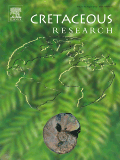
CRETACEOUS RESEARCH
Delving Deep into Earth's Ancient PastCRETACEOUS RESEARCH, published by Academic Press Ltd - Elsevier Science Ltd, is a leading journal in the field of Paleontology that has established itself as an essential resource for researchers and professionals delving into the rich tapestry of the Cretaceous period. With its ISSN 0195-6671 and E-ISSN 1095-998X, this journal boasts a prestigious placement in the academic landscape, holding a Q1 rank in the 2023 Paleontology category and proudly positioned at 21st out of 113 in the Scopus ranking, reflecting its impact factor that places it in the 81st percentile. Since its inception in 1980, CRETACEOUS RESEARCH has facilitated a deeper understanding of prehistoric life and its evolutionary processes, covering topics such as fossil discoveries, paleoecology, and biostratigraphy. This journal best serves those seeking to expand their knowledge and contribute innovative findings to the scientific discourse surrounding the Cretaceous era. As it continues to converge into the future until 2025, it remains dedicated to providing an open platform for the dissemination of high-quality research that shapes our understanding of Earth’s geological past.

Palaeoworld
Decoding the Ecological Narratives of Our Planet's PastPalaeoworld is a leading peer-reviewed journal published by ELSEVIER, focusing on the dynamic and interdisciplinary fields of paleontology, ecology, and stratigraphy. Established in 2006, the journal aims to facilitate the dissemination of innovative research and significant discoveries that enhance our understanding of past life on Earth. With an impressive impact factor and categorized in the second quartile (Q2) for Ecology, Evolution, Behavior and Systematics, Paleontology, and Stratigraphy in 2023, Palaeoworld stands out in its commitment to high-quality scholarship. The journal is indexed in Scopus, ranking #23 in Paleontology and #14 in Stratigraphy, placing it within the top 20% of publications in these categories. As a valuable resource for researchers, professionals, and students alike, it provides unrestricted access to cutting-edge findings, detailed methodologies, and critical assessments of paleo-environmental data. This journal is not only a repository of knowledge but also a platform for advancing discussions that bridge past ecological patterns with contemporary issues.

BOLLETTINO DELLA SOCIETA PALEONTOLOGICA ITALIANA
Unearthing the Past, Shaping the FutureBOLLETTINO DELLA SOCIETA PALEONTOLOGICA ITALIANA is a prestigious journal dedicated to the field of paleontology, published by the SOCIETA PALEONTOLOGICA ITALIANA. Established in 1979, this journal has played a pivotal role in disseminating significant research findings and scholarly articles that enhance our understanding of Earth's biological history. With a proud history of publication stretching from 1979 to 2024, the journal maintains a strong reputation, currently holding a Q2 ranking in Paleontology, reflecting its influence and caliber within the scientific community. Additionally, it is ranked #49 out of 113 in the Earth and Planetary Sciences category by Scopus, placing it in the 57th percentile of its field. While not an open-access journal, it provides critical insights and findings valuable to researchers, professionals, and students alike, fostering a deeper appreciation for paleontological studies. Located in Modena, Italy, the journal continues to be a key resource for advancing knowledge in paleontology, making it an essential read for anyone committed to this fascinating scientific discipline.
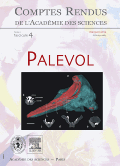
COMPTES RENDUS PALEVOL
Exploring the Depths of Biological HistoryCOMPTES RENDUS PALEVOL, published by ACAD SCIENCES in France, stands as a pivotal journal in the field of paleontology. With an ISSN of 1631-0683 and an E-ISSN of 1777-571X, this esteemed publication provides a platform for innovative research and scholarly discourse, contributing significantly to the understanding of Earth's biological history. Having achieved a commendable Q2 rank in the 2023 Paleontology category and positioned at Rank #63 out of 113 in the Scopus Earth and Planetary Sciences segment, it underscores its relevance and influence in the scientific community. The journal's converged years from 2002 to 2024 reflect a commitment to ongoing research and knowledge dissemination. Although currently lacking open access options, the journal's rigorous peer-review process ensures the integrity and quality of published articles, making it an essential resource for researchers, professionals, and students striving to explore and expand their expertise in paleontological sciences.

PALAEONTOLOGIA ELECTRONICA
Fostering Collaboration in the Study of Ancient LifePALAEONTOLOGIA ELECTRONICA is a distinguished open-access journal published by COQUINA PRESS, offering a vital platform for the dissemination of cutting-edge research in the fields of Paleontology and Oceanography. Launched in 1998, this journal has continuously fostered scholarly communication, allowing unrestricted access to scientific findings and contributing significantly to the advancement of the field. With an impressive track record since its inception, PALAEONTOLOGIA ELECTRONICA holds a 2023 Scopus ranking of #39 out of 113 in the Paleontology category, demonstrating its value among academic resources as evidenced by its Q2 quartile ranking. The journal is based in the United States, and it encourages submissions that span a diverse range of topics, from fossil analysis to evolutionary biology. As a prominent resource for researchers, educators, and students alike, it plays a crucial role in shaping the future of paleontological study.